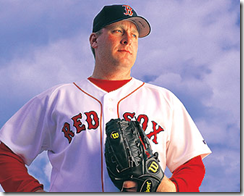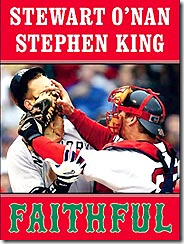I’m listening to the book Faithful: Two Diehard Boston Red Sox Fans Chronicle the Historic 2004 Season by Stephen King and Stuart O’Nan. It’s essentially a double-entry journal that chronicles the Red Sox for one season. It’s full of traditional journal entries, email exchanges, summaries of phone calls between the two men, and recollections of games they attended alone and together.
Even though I am a Yankees fan, I’m enjoying the book a lot, though I suspect I will enjoy it much less once I reach the postseason entries. By some stroke of genius, King and O’Nan chose to work on this book during the season in which the Red Sox win their first World Series since 1918.
Lucky bastards.
But having grown up in Massachusetts, I spent a lot of time around Red Sox fans, so listening to what King and O’Nan have to say about the team and the game of baseball is a little bit like going home.
I also like both writers a lot.
O’Nan taught at creative writing at Trinity College during my time there, and I was fortunate enough to squeeze in one class with him before he left. I’ve heard him speak a few times since then, and I’ve read several of his books, including most recently LAST NIGHT AT THE LOBSTER. Years ago I read his nonfiction account of the Hartford Circus Fire, and I cannot recommend it enough.
Stephen King has become a bit of a hero to me, for several reasons.
Growing up without very few books in my home, it wasn’t until I was granted my own library card that I really began reading and falling in love with books, and many of those first books were written by Stephen King. NIGHT SHIFT, DIFFERENT SEASONS, THE SHINING, and CUJO were just a few of the novels I read that first summer, and I loved every one of them.
Eventually I would go on to read all of King’s work, including IT, which I have read at least a dozen times, and his Dark Tower series, which I consider a genuine masterpiece.
Two decades later, it would be another one of King’s books, ON WRITING, that would inspire me to continue writing when the possibility of a writing career felt impossible and hopeless. The first half of ON WRITING is an autobiographical account of King’s life as a writer, including his very humble beginnings as a short story writer for men’s magazines. The image of Stephen King siting in the laundry room of his trailer, shoved against the washing machine, unable to afford medicine for his sick children, sent me back to the laptop ready and willing to conquer the beast.
At the age of ten, Stephen King opened my mind to the world of books and reading, and thirty years later, I have now joined his fraternity. It’s an incredible feeling. Sort of like idolizing a ballplayer as a kid and then finding yourself playing alongside that same player someday.
In reading FAITHFUL, I’ve learned a few things about King that I did not know, specifically in terms of his approach to time management. It turns out that he and I have a lot in common in this regard.
While watching the Red Sox game, King has a book in his lap, and in between innings, he will read. He estimates that he can read about 40 pages during the average baseball game.
I have also been known to do this, in addition to spending commercial breaks listening to audiobooks and podcasts or pounding away at the laptop. From time to time I’ve also been known to listen to an audiobook while watching television, especially when the show is somewhat mindless and predictable.
Even more impressive, King writes about how he will listen to the ballgame on his car radio but switch over to an audiobook in between innings, timing the two minute commercial break with his wrist watch.
Similarly, I can be found at the gym with two sets of headphones when running on the elliptical. One is a wireless pair connected to my iPhone, through which I am undoubtedly listening to an audiobook or podcast. The second pair is attached to the machine so I can listen to the television affixed to it. I will switch between these two headphones during a workout in order to take advantage of commercial breaks, which has caused more than one fellow gym rat to stare at me in confusion. Yesterday, for example, I was watching the replay of the Yankees game from the day before as I worked out, and similar to King, I would switch headphones between innings and listen to my book, which happened to be King and O’Nan discussing the Red Sox “June swoon.”
Fear not, boys. Things will turn around for the Sox soon enough.
I’ve often thought that if Stephen King and I had the chance to get to know one another, we would be fast friends. While this is unlikely to ever happen, I do hope that he reads one of my books someday, which isn’t asking much considering the number of books the man reads on a yearly basis. I wouldn't even need to know if he liked the book or not. Just knowing that the author who inspired a ten year old boy to read and a thirty year old man to write picked up one of my novels would be enough for me.



